Martin Francis is a British-American academic historian. He was Henry R. Winkler Professor of Modern History at the University of Cincinnati from 2003 to 2015, when he was appointed Professor of War and History at the University of Sussex.
Martin Francis is a British-American academic historian. He was Henry R. Winkler Professor of Modern History at the University of Cincinnati from 2003 to 2015, when he was appointed Professor of War and History at the University of Sussex.
Martin Francis was awarded a Bachelor of Arts (BA) degree from the University of Manchester in 1985, and went on to complete a doctorate (DPhil) at the University of Oxford in 1994, [1] awarded for a thesis entitled "Labour policies and socialist ideas: the example of the Attlee government, 1945–1951". [2] Francis taught at Corpus Christi College, Oxford, the University of Wales, Aberystwyth, and Royal Holloway, University of London, before being appointed Henry R. Winkler Professor of Modern History at the University of Cincinnati in 2003. In 2015, he returned to the United Kingdom as Professor of War and History at the University of Sussex. [1]
Francis's work focuses on 20th-century British politics and gender; he has written on the Labour Party, masculinity, leisure, the cultural impact of modern warfare, the emotional economy in British politics, and British cinema. His published works include: [1]
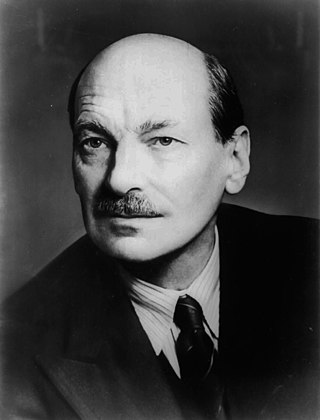
Clement Richard Attlee, 1st Earl Attlee, was a British statesman and Labour Party politician who served as Prime Minister of the United Kingdom from 1945 to 1951 and Leader of the Labour Party from 1935 to 1955. He was Deputy Prime Minister during the wartime coalition government under Winston Churchill, and served twice as Leader of the Opposition from 1935 to 1940 and from 1951 to 1955. Attlee remains the longest serving Labour leader.
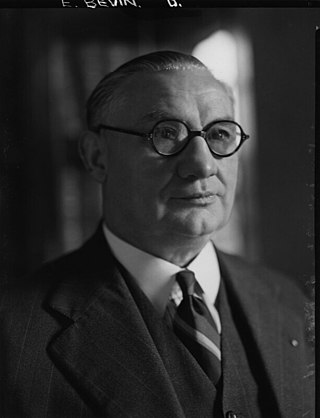
Ernest Bevin was a British statesman, trade union leader and Labour Party politician. He cofounded and served as General Secretary of the powerful Transport and General Workers' Union from 1922 to 1940 and served as Minister of Labour and National Service in the wartime coalition government. He succeeded in maximising the British labour supply for both the armed services and domestic industrial production with a minimum of strikes and disruption.
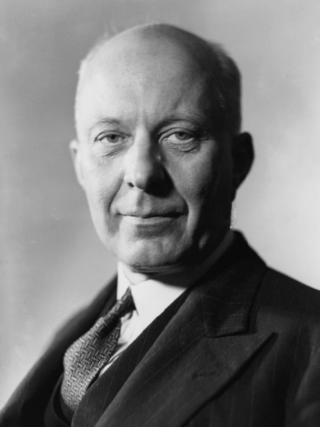
Edward Hugh John Neale Dalton, Baron Dalton, was a British Labour Party economist and politician who served as Chancellor of the Exchequer from 1945 to 1947. He shaped Labour Party foreign policy in the 1930s, opposing pacifism; promoting rearmament against the German threat; and strongly opposed the appeasement policy of Prime Minister Neville Chamberlain in 1938. Dalton served in Winston Churchill's wartime coalition cabinet; after the Dunkirk evacuation he was Minister of Economic Warfare, and established the Special Operations Executive. As Chancellor, he pushed his policy of cheap money too hard, and mishandled the sterling crisis of 1947. His political position was already in jeopardy in 1947 when he, seemingly inadvertently, revealed a sentence of the budget to a reporter minutes before delivering his budget speech. Prime Minister Clement Attlee accepted his resignation; Dalton later returned to the cabinet in relatively minor positions.

Christopher Addison, 1st Viscount Addison,, was a British medical doctor and politician. A member of the Liberal and Labour parties, he served as Minister of Munitions during the First World War and was later Minister of Health under David Lloyd George and Leader of the House of Lords under Clement Attlee.
The post-war consensus, sometimes called the post-war compromise, was the economic order and social model of which the major political parties in post-war Britain shared a consensus supporting view, from the end of World War II in 1945 to the late-1970s. It ended during the governance of Conservative Party leader Margaret Thatcher. The consensus tolerated or encouraged nationalisation, strong trade unions, heavy regulation, high taxes, and an extensive welfare state.

Clement Attlee was invited by King George VI to form the Attlee ministry in the United Kingdom in July 1945, succeeding Winston Churchill as Prime Minister of the United Kingdom. The Labour Party had won a landslide victory at the 1945 general election, and went on to enact policies of what became known as the post-war consensus, including the establishment of the welfare state and the nationalisation of some industries. The government's spell in office was marked by post-war austerity measures, the violent crushing of pro-independence and communist movements in Malaya, the grant of independence to India, the engagement in the Cold War against Soviet Communism as well as the creation of the country's National Health Service (NHS).
The Future of Socialism is a 1956 book by Anthony Crosland. It was one of the most influential books in post-war British Labour Party thinking. It was the seminal work of the 'revisionist' school of Labour politics.
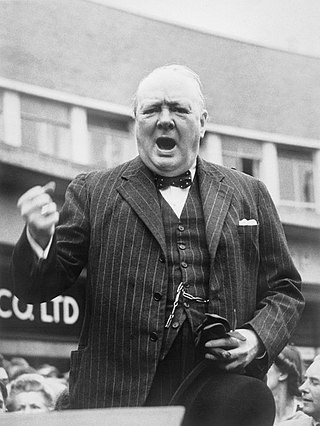
The Churchill caretaker ministry was a short-term British government in the latter stages of the Second World War, from 23 May to 26 July 1945. The prime minister was Winston Churchill, leader of the Conservative Party. This government succeeded the national coalition which he had formed after he was first appointed prime minister on 10 May 1940. The coalition had comprised leading members of the Conservative, Labour and Liberal parties and it was terminated soon after the defeat of Nazi Germany because the parties could not agree on whether it should continue until after the defeat of Japan.
Social democracy is a political, social, and economic philosophy within socialism that supports political and economic democracy. As a policy regime, it is described by academics as advocating economic and social interventions to promote social justice within the framework of a liberal-democratic polity and a capitalist-oriented mixed economy. The protocols and norms used to accomplish this involve a commitment to representative and participatory democracy, measures for income redistribution, regulation of the economy in the general interest, and social welfare provisions. Due to longstanding governance by social democratic parties during the post-war consensus and their influence on socioeconomic policy in Northern and Western Europe, social democracy became associated with Keynesianism, the Nordic model, the social-liberal paradigm, and welfare states within political circles in the late 20th century. It has been described as the most common form of Western or modern socialism, as well as the reformist wing of democratic socialism.
The Labour Party is a political party in the United Kingdom that has been described as an alliance of social democrats, democratic socialists and trade unionists. The Labour Party sits on the centre-left of the political spectrum. In all general elections since 1922, Labour has been either the governing party or the Official Opposition. There have been six Labour prime ministers and thirteen Labour ministries. Since the 2010 general election, it has been the second-largest UK political party by the number of votes cast, behind the Conservative Party and ahead of the Liberal Democrats. The party holds the annual Labour Party Conference, at which party policy is formulated.
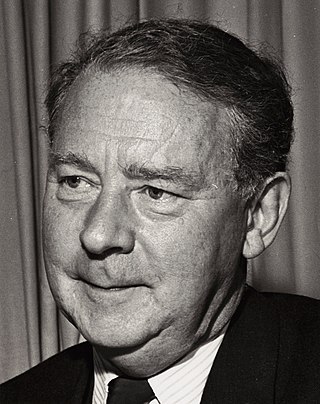
Gaitskellism was the ideology of a faction in the British Labour Party in the 1950s and early 1960s which opposed many of the economic policies of the trade unions, especially nationalisation and control of the economy.
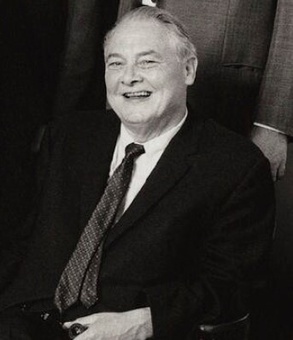
Edward Francis Williams, Baron Francis-Williams, known as Frank Williams, was a British newspaper editor, political advisor and author.
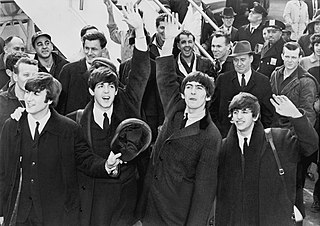
The United Kingdom was one of the victors of the Second World War, but victory was costly in social and economic terms. Thus, the late 1940s was a time of austerity and economic restraint, which gave way to prosperity in the 1950s. The Labour Party, led by wartime Deputy Prime Minister Clement Attlee, won the 1945 postwar general election in an unexpected landslide and formed their first ever majority government. Labour governed until 1951, and granted independence to India in 1947. Most of the other major overseas colonies became independent in the late 1950s and early 1960s. The UK collaborated closely with the United States during the Cold War after 1947 and in 1949, helped form NATO as a military alliance against the spread of Soviet Communism. After a long debate and initial skepticism, the United Kingdom joined the European Economic Community along with the Republic of Ireland and Denmark on 1 January 1973. Immigration from the British Empire and Commonwealth laid the foundations for the multicultural society in today's Britain, while traditional Anglican and other denominations of Christianity declined.

Harold Joseph Laski was an English political theorist and economist. He was active in politics and served as the chairman of the British Labour Party from 1945 to 1946 and was a professor at the London School of Economics from 1926 to 1950. He first promoted pluralism by emphasising the importance of local voluntary communities such as trade unions. After 1930, he began to emphasize the need for a workers' revolution, which he hinted might be violent. Laski's position angered Labour leaders who promised a nonviolent democratic transformation. Laski's position on democracy-threatening violence came under further attack from Prime Minister Winston Churchill in the 1945 general election, and the Labour Party had to disavow Laski, its own chairman.
Ethical socialism is a political philosophy that appeals to socialism on ethical and moral grounds as opposed to consumeristic, economic, and egoistic grounds. It emphasizes the need for a morally conscious economy based upon the principles of altruism, cooperation, and social justice while opposing possessive individualism.
Ina-Maria Zweiniger-Bargielowska, known professionally as Ina Zweiniger-Bargielowska, is a British-American academic historian specialising in 20th-century Britain. Since 2010, she has been Professor of History at the University of Illinois at Chicago.
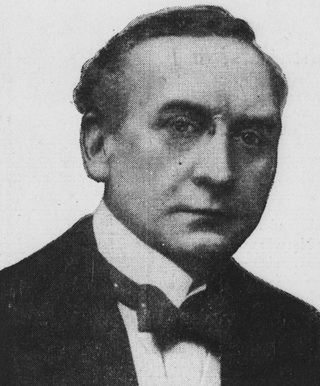
Leonard Llewelyn Bulkeley Williams was a Welsh physician and writer best known for his research on obesity and advocacy of a raw vegetarian diet.

When Britain emerged victorious from the Second World War, the Labour Party under Clement Attlee came to power and created a comprehensive welfare state, with the establishment of the National Health Service giving free healthcare to all British citizens, and other reforms to benefits. The Bank of England, railways, heavy industry, and coal mining were all nationalised. The most controversial issue was nationalisation of steel, which was profitable unlike the others. Economic recovery was slow, housing was in short supply, bread was rationed along with many necessities in short supply. It was an "age of austerity". American loans and Marshall Plan grants kept the economy afloat. India, Pakistan, Burma and Ceylon gained independence. Britain was a strong anti-Soviet factor in the Cold War and helped found NATO in 1949. Many historians describe this era as the "post-war consensus" emphasizing how both the Labour and Conservative parties until the 1970s tolerated or encouraged nationalisation, strong trade unions, heavy regulation, high taxes, and a generous welfare state.
Jonathan Mark Lawrence, FRHistS is a British historian. Since 2019, he has been Professor of Modern British History at the University of Exeter.
Penelope Summerfield, FBA, FRHistS, FAcSS, commonly known as Penny Summerfield, is an English historian and retired academic.